Insiders say Marilyn Manson’s ‘spooky’ persona has never been an act
Marilyn Manson has been shocking fans for years with his onstage antics. Now, as assault allegations surface, insiders say it’s hardly an act.
In his keynote address for the 1997 College Music Journal Music Marathon, Marilyn Manson – the goth-metal shock-rocker whose controversial Antichrist Superstar album debuted at No. 3 on the Billboard charts a year earlier – took a moment to discuss his inspiration.
“The character Lucifer in the Bible is to me a hero, because he got kicked out of heaven when he wanted to be God,” Manson told the crowd.
Plenty of rock stars pretend to have sympathy for the devil. But sources say that, for Manson, it wasn’t an act.
RELATED: Graphic Marilyn Manson video resurfaces
More than 23 years later, Manson has been dropped by the music industry after a number of women have accused the 52-year-old of behaving like the devil – by physically, mentally and sexually abusing them.
Earlier this month, 33-year-old Westworld actress and Emmy nominee Evan Rachel Wood accused former fiancé Brian Warner – Manson’s real name – of abusing her.
“He started grooming me when I was a teenager and horrifically abused me for years,” she wrote in her statement.
“I was brainwashed and manipulated into submission. I am done living in fear of retaliation, slander, or blackmail. I am here to expose this dangerous man and call out the many industries that have enabled him, before he ruins any more lives.”
RELATED: Sick game Manson would play on female fans
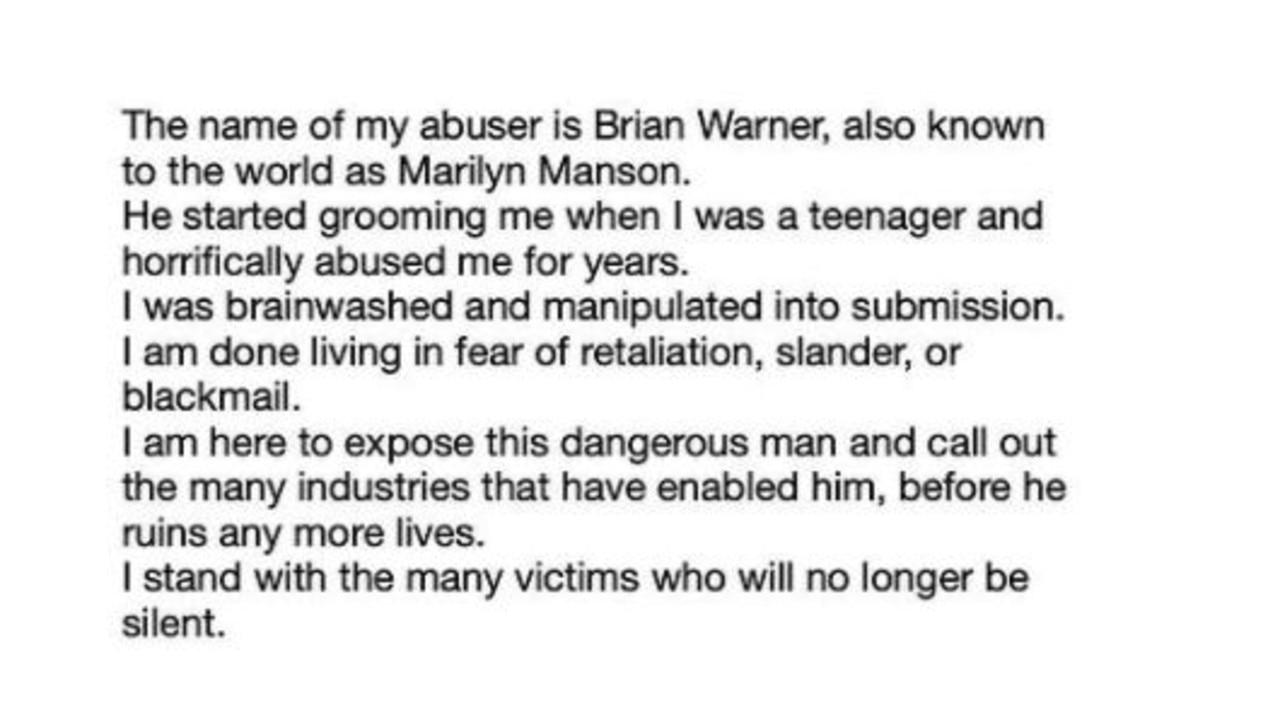
The fallout was swift. Model Sarah McNeilly released her own statement alleging Manson locked her in rooms when she was “bad” and forced her to listen to him entertaining other women – leaving her “emotionally abused, terrorised and scarred”.
Actor Ashley Lindsay Morgan, who’s Jewish, detailed instances in which Manson allegedly asked her to bring him Nazi memorabilia from Thailand. Shortly after, Manson’s record label and television shows dropped him – as did the talent agency CAA, which also represents Wood.
Manson released his own statement, claiming that the charges “are horrible distortions of reality,” as well as noting that “my art and my life have long been magnets for controversy”.
RELATED: Manson’s string of high-profile romances
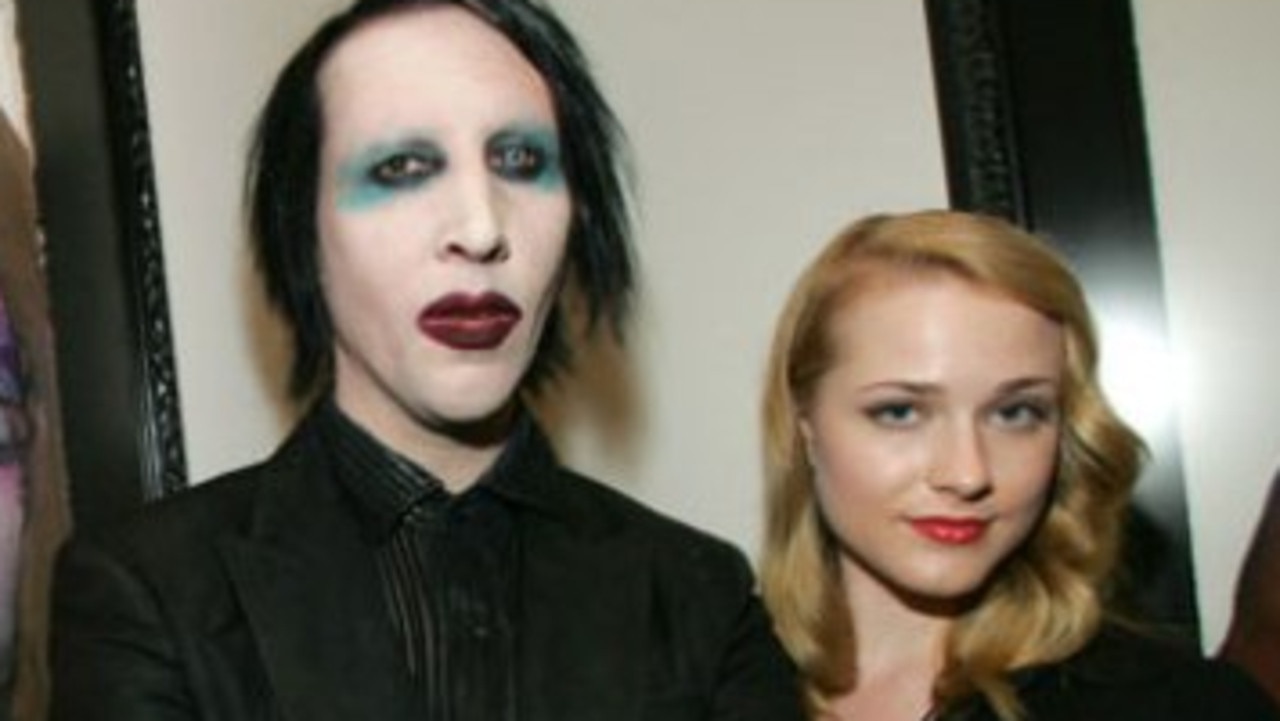
Neither CAA nor Manson responded to the New York Post’s requests for comment.
Over the years, Manson has crafted a creepy public persona – slicing his chest with a broken beer bottle onstage in 1995 and allegedly sexually assaulting an Ozzfest security guard in 2001 (the sexual assault charges were later dropped; Manson pleaded no contest to a battery charge and settled for an undisclosed sum in 2004) – that now appears to be the same as his private one.
“I never saw a disconnect between … the Marilyn Manson that was onstage and the Marilyn Manson that came offstage – they were just different levels of intensity,” 53-year-old Kurt B. Reighley, who published the 1998 Marilyn Manson biography, told the Post.
“He was very good at sensationalism, but I don’t think he ever misrepresented himself – and I’m sorry to say none of the things that have come to light are the least bit surprising or shocking to me.”
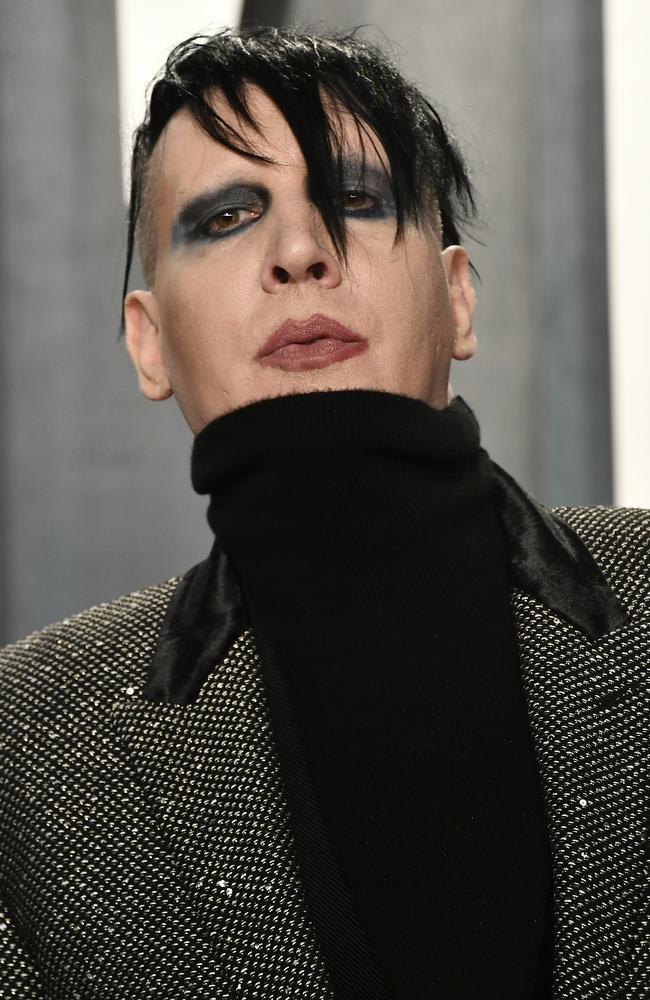
Using a portmanteau of Marilyn Monroe and Charles Manson, Warner formed Marilyn Manson & the Spooky Kids with Daisy Berkowitz (the late Scott Putesky) in 1989.
Nine Inch Nails frontman Trent Reznor eventually signed the group – its name now shortened to Marilyn Manson – to his Nothing Records imprint, and produced the band’s 1994 debut album Portrait of an American Family.
Reznor’s then-mentorship (he distanced himself from Manson more than two decades ago) helped put Manson on a much larger stage – and in his career, Manson has sold more than 50 million albums worldwide.
But Manson had other goals – including questioning Christianity through his music and provoking organisations such as the Parents Music Resource Center, which aimed to increase parental control over kids’ musical preferences.
“Since the 1980s, when people were looking to blame rock music for its effects on society and looking to tame it in some way, label it, contain it – Manson wanted to push those boundaries,” Theo Cateforis, 52, associate professor of music history and cultures at Syracuse University, told the Post. “That’s what his whole persona was based upon.”
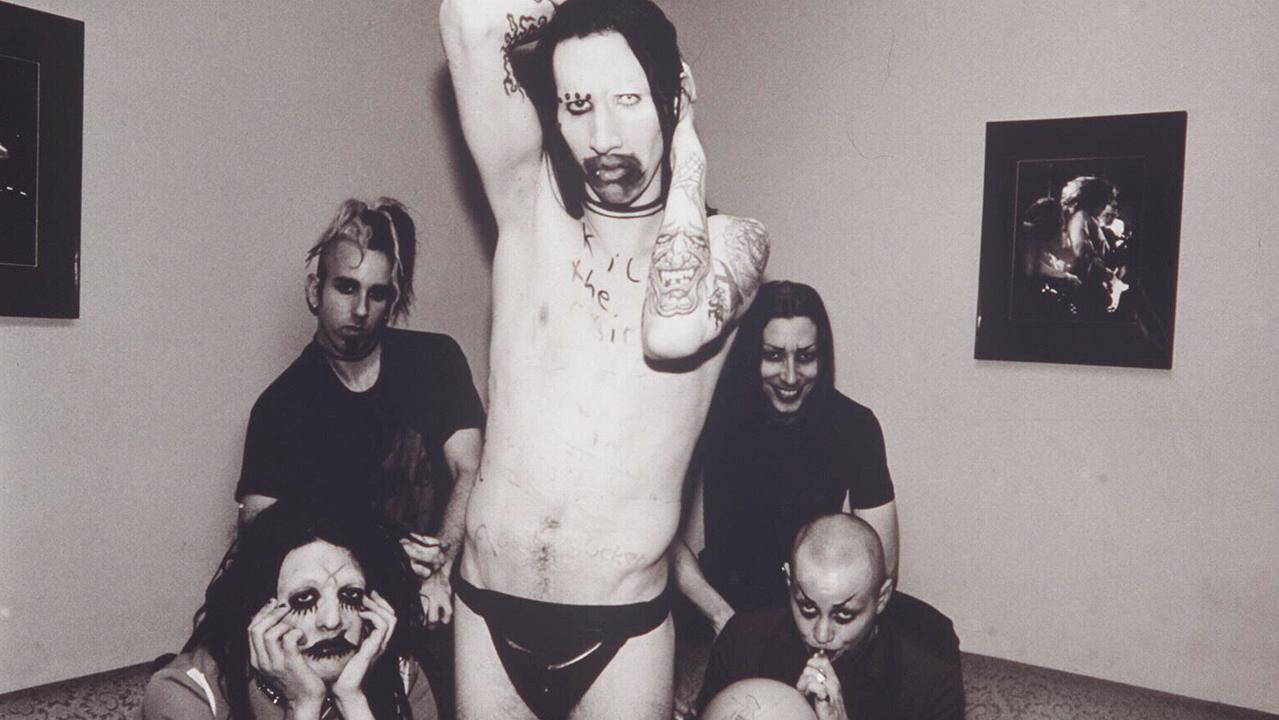
His concert presence – deemed by fans as electrifying – was also crude, including tearing up Bibles and using the American flag as toilet paper.
Conservatives despised him for it.
The American Family Association, a Christian group, held protests outside his shows.
In 1997, the association’s Gulf Coast chapter posted anonymous “affidavits” on its website claiming that Manson raped a dog onstage, held Satanic services with virgin sacrifices and threw both puppies and kittens into the audience to be torn apart.
(The band denied these claims and threatened to sue for libel and defamation, and the group took the claims off its website.)
Still, Manson remained unwelcome in various corners of the nation. He ripped up a Book of Mormon in front of an Utah audience in 1994, which got him banned from playing in the state. In 1997, venues in Idaho, Alaska, Massachusetts and Texas cancelled concerts – and South Carolina paid him $40,000 not to play there.
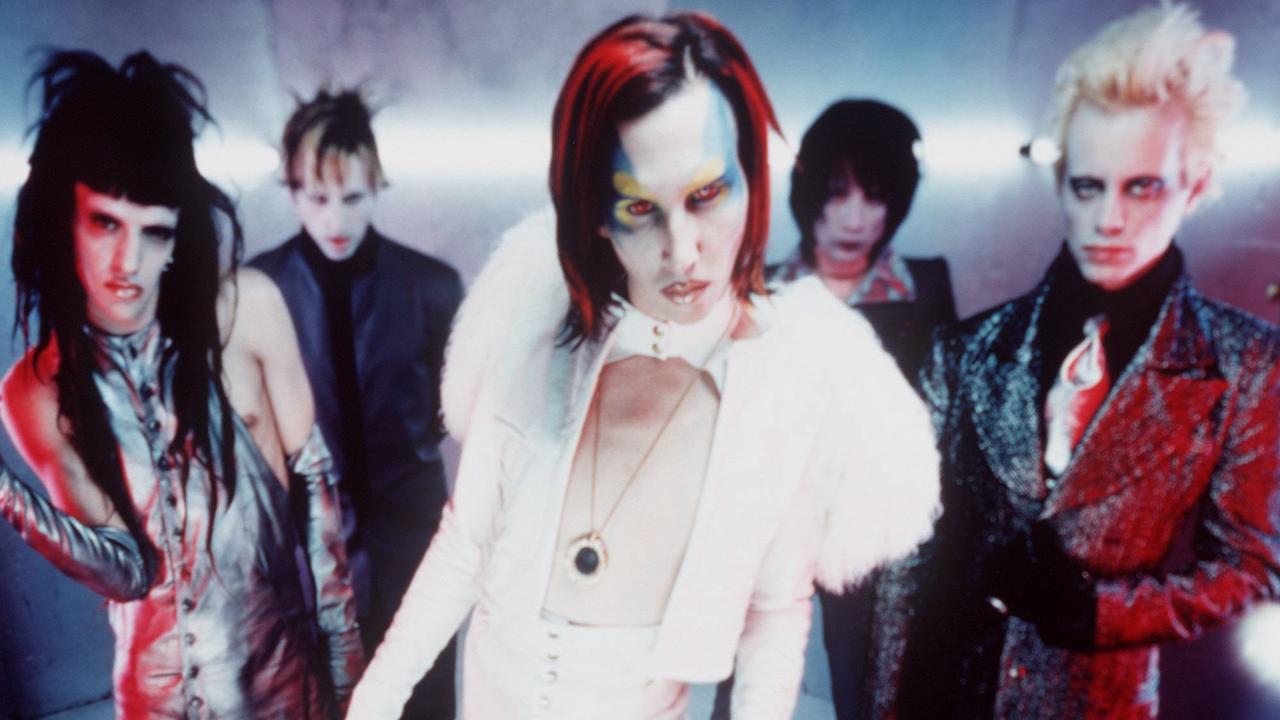
Manson’s lyrics have also included themes of violence, with some alleging he inspired the 1999 Columbine school massacre in Colorado because the two shooters were fans. (They weren’t.)
“Honestly, the Columbine era destroyed my entire career at the time,” Manson told The Guardian in 2017.
Although musicians such as Ozzy Osbourne – who infamously bit off the head of a bat onstage in Des Moines in 1982 – had previously courted controversy, nobody had done so quite to the degree as Manson.
“In the United States … I don’t think you could point to someone prior to Manson where it was really magnified to the extent that it was around him,” said Cateforis.
Manson’s startling antics also included an openness in discussing the violence he’s inflicted upon women or fantasised about.
In his 1999 autobiography The Long Hard Road Out of Hell, co-written with Neil Strauss, Manson admitted to smashing his mother in the face with a glass perfume bottle. Not only did the shards leave her permanently scarred, but Manson said he felt no regrets since he suspected her of cheating on his father.
“She just cried, and I never felt sorry for her,” he wrote, adding that he “hit her, spit on her and tried to choke her”.
The inflammatory autobiography also included details alleging Manson and Reznor physically and sexually assaulted an inebriated woman in the 1990s – a claim that Reznor has repeatedly called a “complete fabrication”.
The accused abuser also copped to nearly orchestrating the “perfect murder” in the early 1990s of a lover and former bandmate named Nancy. He enlisted the help of a friend; together they “followed her, cased out her house and figured out her routine”.
“This was the first time I had ever seriously considered murder … She had to die,” he wrote of the plan to burn down Nancy’s Fort Lauderdale, Florida, home with her inside of it – which, at the last minute, gave them cold feet.
“While I didn’t think it was right to take a human life, I didn’t think it was right to deny myself the chance of causing someone to die either, especially someone whose existence meant so little to the world and to herself,” he wrote in the autobiography.
“At the time, taking someone’s life seemed like a necessary growing and learning experience, like losing your virginity or having a child.”
In that same book, Manson – who’s now married to 36-year-old photographer Lindsay Usich – admitted to making rape threats against a woman who refused his and a friend’s advances. The harassment began with daily threatening phone calls for nearly a month, then grew even more serious in tone.
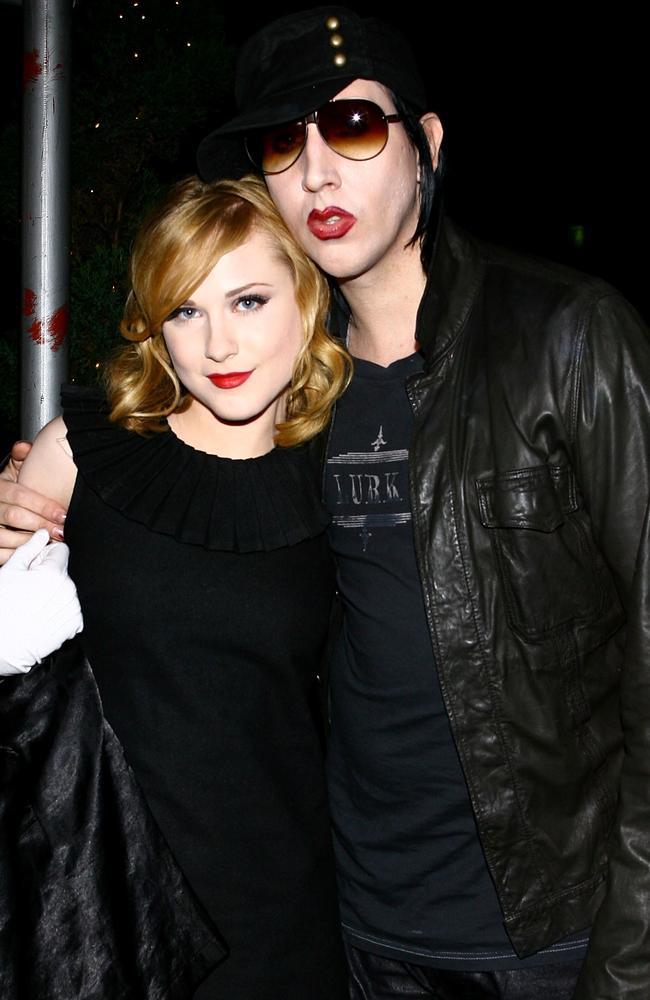
“‘We’re watching you,’ we’d threaten at the height of our spite-masked lust,” he wrote. “‘You better not leave work tonight, because we’re going to rape you in the parking lot and then crush you underneath your own car.’”
As disturbingly as he allegedly comported himself in private, Manson also lived in creepy settings.
In a tweet last week, 26-year-old musician Phoebe Bridgers said that when she visited Manson’s home – whose location she doesn’t reveal – as a teenager, he referred to a “rape room”.
Manson now reportedly lives in the Hollywood Hills of Los Angeles, where he’s been known to keep creepy items such as the skeleton of a Chinese girl and a clown painting done by the serial killer John Wayne Gacy.
According to a 2015 Rolling Stone article, Manson and his fellow scandal-ridden pal Johnny Depp – Manson is godfather to his daughter Lily Rose – once tried to buy the gun Hitler used to kill himself. In the same article, Manson noted that he’s “flypaper for damaged women”.
He’s also publicly spoken about his twisted feelings about Wood, whom he met in 2005 when she was just 18 years old.
The pair – who got engaged in 2010, but split up that same year – had an on-and-off relationship for four years. In a 2009 Q&A with Spin magazine, Manson shared disturbing details of one of their breakups, including calling Wood 158 times on Christmas 2008.
Every time he did, he said, “I took a razor blade and I cut myself on my face or on my hands … I wanted to show her the pain she put me through.”
He also added that “I have fantasies every day about smashing her skull in with a sledgehammer.”
Manson’s previous exes have come out in support of Wood, including his first wife, Dita Von Teese, who said in her statement that she left Manson in late 2006 “due to infidelity and drug abuse”.
“Please know that the details made public do not match my personal experience during our 7 years together as a couple,” she added.
Another Manson ex, #MeToo activist Rose McGowan, tweeted her support of Wood.
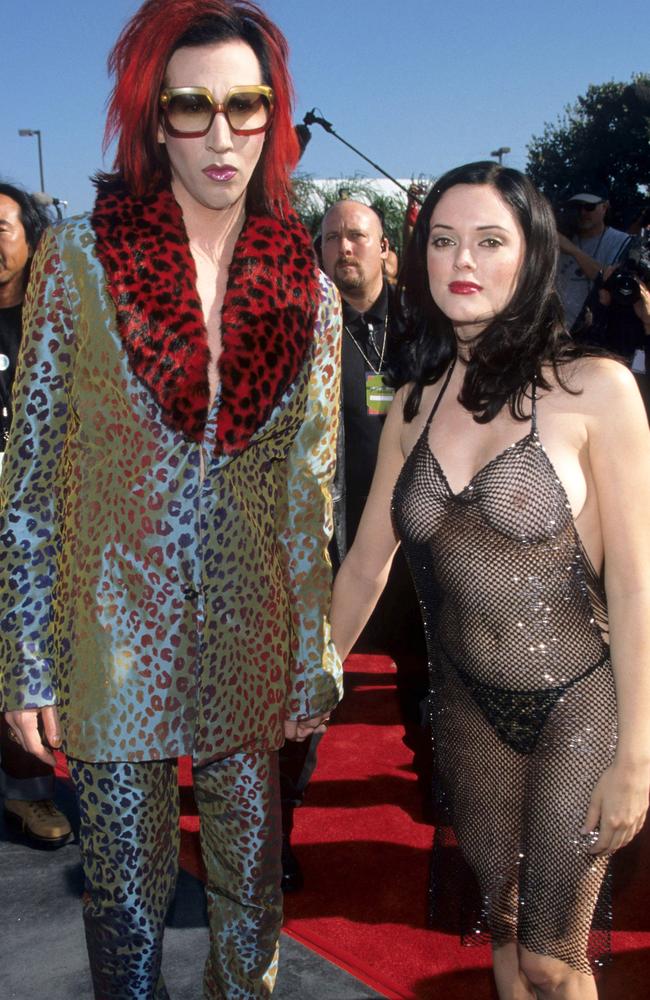
Former porn star Jenna Jameson, who didn’t respond to a request from the New York Post seeking comment, said last week she ended a 1997 fling with Manson because he bit her during sex and fantasised about burning her alive.
“He is a lot. To say the least,” Jameson told the Daily Mail.
Marilyn Manson’s brand of shock rock may have broken out during a very different time in the music industry, but insiders say the alarming clues were there for all to see.
“I think what’s come out now, it was all kind of right in front of us,” said Cateforis. “This guy was really acting in these awful ways, but we are so conditioned to accept the persona of a rock star as a type of fiction – that people didn’t take heed of those warning signs.”
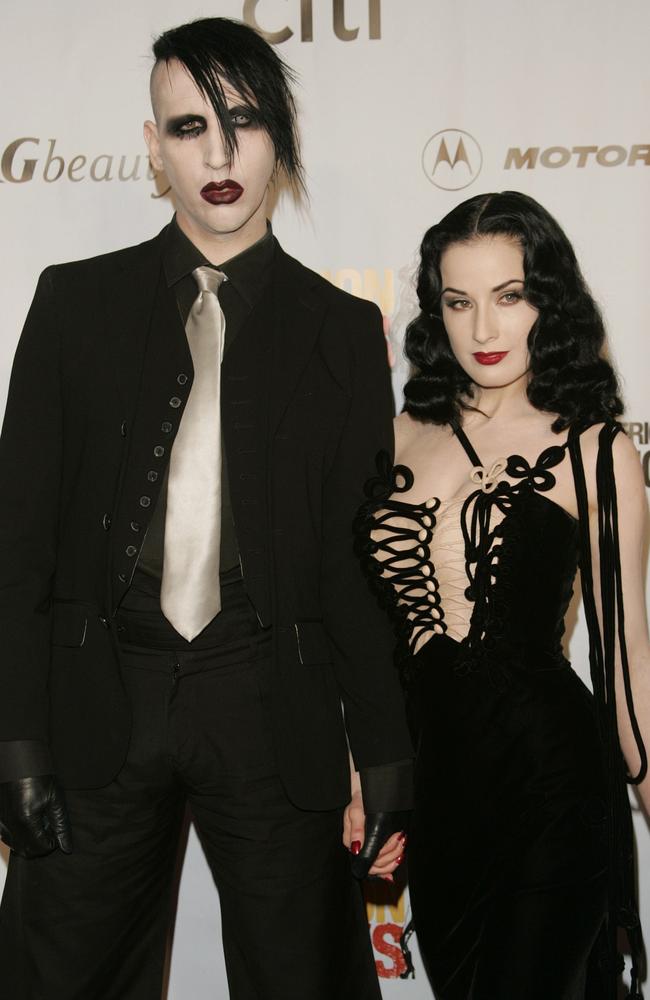
“There’s no mystery about the kind of person that Marilyn Manson probably was,” added Jem Aswad, senior music editor at Variety.
“(Manson) comes out of this era where there wasn’t a whole lot of people telling him to hold back. Everything in music was super provocative – and things aren’t like that now.”
After Woods’ allegations, the establishment swiftly turned its back on the past-his-prime Manson.
But even if Manson’s creep show has been cancelled, his music will still be heard.
“I think if you just went on Spotify right now and wanted to listen to Antichrist Superstar, I don’t think you’d have any trouble,” said Aswad. “They learned their lesson when they tried to cancel R. Kelly.”
This article originally appeared in the New York Post and was reproduced with permission



